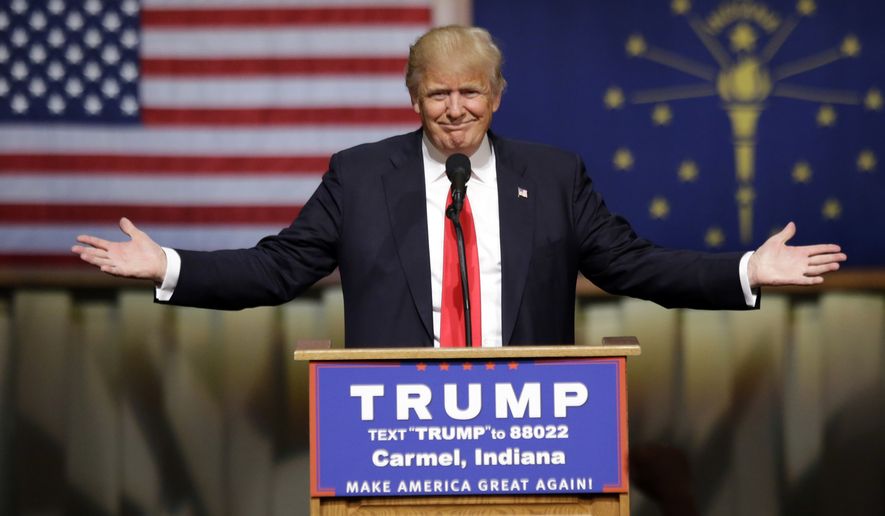ANALYSIS:
Donald Trump was only a tad presumptuous when on April 26 he said, “I consider myself the presumptive nominee — absolutely.”
The boastful billionaire actually does appear on his way to owning the 1,237 first-ballot votes needed to win the nomination, according to The Washington Times state-by-state delegate-allocation analysis.
Astoundingly, it looks like the Donald can get to a majority without any unbound but voluntarily committed delegates added to his total.
Going into Indiana’s Tuesday primary, the TV showman of “you’re fired” fame is short of a majority by a bit over 200 bound delegates — that is, delegates allocated to him based on state primaries or caucuses.
He now has to win those 200 in the final 10 GOP presidential nomination contests. But even if he missed the mark by 100 or fewer, it’s now considered likely that enough unbound delegates will back him rather than see the convention descend into multiballot war.
Not that the depth of disdain for Mr. Trump has at all waned among the #NeverTrump conservatives. Columnist George Will, for example, thundered Saturday that a “convention’s sovereign duty is to choose a plausible nominee who has a reasonable chance to win, not to passively affirm the will of a mere plurality of voters recorded episodically in a protracted process.”
But to the likely displeasure of Mr. Will and his ilk, The Times analysis understates Mr. Trump’s probable final haul by as many as 78 delegates because it excludes unbound delegates, including those in Pennsylvania and elsewhere, who have said they plan to vote for him.
In other words, this chart has him over the top even though it counts only delegates he has won outright in various state primaries, caucuses and conventions.
Under state parties’ rules, these delegates are bound as tight as mummies to Mr. Trump for the first ballot. They can renounce Mr. Trump and say they really support Ted Cruz — or anyone else. Even if a #NeverTrump delegate doesn’t show up to be counted at the vast Cleveland hall in July, when the convention secretary records each state’s tally, the delegates bound to a candidate go to him.
Jim Ellis, a delegate-allocation expert and political adviser to then-House Majority Leader Tom DeLay, said Mr. Trump’s performance in the five primaries last Tuesday and the latest Indiana polls now point strongly to a first-ballot win.
On June 7 California will in effect have 54 separate GOP presidential nomination contests, with three delegates going to the winner in each of the state’s 53 congressional districts, and 10 “at-large” delegates going to whoever wins the most votes statewide.
“Trump will need to capture the California statewide vote and 31 of the 53 congressional districts,” Mr. Ellis said. That result would give him a total of 103 bound California delegates.
There’s an even brighter scenario for Mr. Trump mapped out by former Republican National Committee Treasurer Randy Pullen, whose count includes unbound delegates who are known to have committed to one or another candidate.
For example, Mr. Pullen grants Mr. Trump all Pennsylvania’s 54 technically uncommitted delegates because “he won every congressional district in the state on Tuesday.”
Many of those running for delegate slots in Pennsylvania said they would vote, at least on the first ballot, for the winner of their district. Others ran as delegates committed to Mr. Trump.
In the Pullen projection, Mr. Trump also wins more California congressional districts for a total haul of 120 delegates. Mr. Pullen’s state-by-state chart has Mr. Trump’s total haul at 1,315 delegates.
“I have had Trump winning 1,237 for two months, and Trump had consistently outperformed my projections,” he said.
Mr. Trump will be the “presumptive nominee, with more than 1,300 confirmed delegates after June 7,” Mr. Pullen said. “This number will swell as we approach the convention. Cruz will be 500 delegates short on June 7, and Kasich will be lost in the rearview mirror.”
As of this moment, before the Indiana votes are counted, Mr. Pullen’s projection has Mr. Trump needing only 45 percent of the delegates yet to be allocated in the final 10 contests in order to become the GOP standard bearer.
But if The Times approach of allocating only bound delegates is used, Mr. Ellis notes that Mr. Trump “will need 55.8 percent of the available delegates to score a first-ballot win without the aid of unbound delegates.”
Even that once-forbiddingly high percentage no longer seems as unscalable as Mr. Trump’s promised wall.
“All of a sudden, this is now looking very doable for him,” Mr. Pullen said.
“I respect Cruz and Kasich, who will continue the fight to the end,” he said. “But the unbound delegates will fade away from Ted as they coalesce around the winner. ’Trump, Trump, Trump!’ will be the call of our party.
Just in case the call of the party turns out to be “Never Trump, Never Trump, Never Trump,” Mr. Pullen issued a challenge many fellow conservatives have been repeating in emails, on Facebook and on Twitter.
“The party faithful supported the establishment’s choices in 2008 and 2012,” he said, alluding to Sen. John McCain and former Massachusetts Gov. Mitt Romney.
“Will the establishment return the favor this time, or will they turn away, take their ball, go home and pout?” Mr. Pullen said.
Mr. Pullen also dismissed the hiccup-prone, sort-of agreement that Mr. Kasich will leave Mr. Cruz to compete alone against Mr. Trump in Indiana in exchange for Mr. Cruz staying out of other primaries that Mr. Kasich wants to himself.
It “has about as much chance of stopping Trump on his way to the nomination as Don Quixote and Sancho Panza had of knocking down the windmill,” he said.
• Ralph Z. Hallow can be reached at rhallow@gmail.com.




Please read our comment policy before commenting.